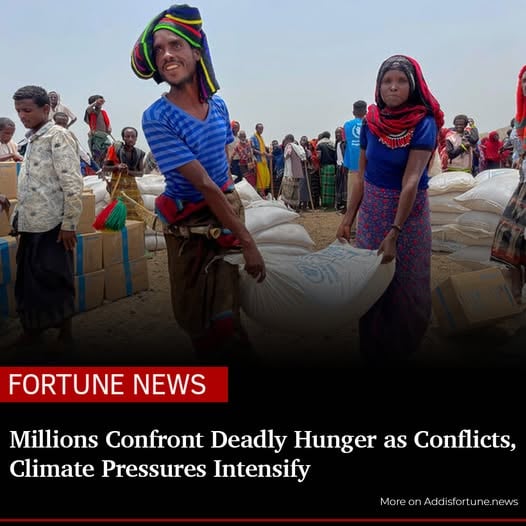
In the 2024 Global Hunger Index, EThiopia is positioned 102nd among the 127 countries for which adequate data is available to compute the GHI scores for that year. The nation has recorded a score of 26.2, indicating a serious level of hunger within its population.
The GHI score for Ethiopia is derived from the assessment of four key component indicators, which collectively contribute to the overall evaluation of hunger in the country.
Ethiopia is currently facing a significant food crisis, with approximately 15.8 million people experiencing severe hunger. The World Food Programme (WFP) has reported that many individuals in the country are unable to access adequate food supplies, highlighting the dire situation through information available on the internet. This alarming trend underscores the urgent need for assistance to address the growing food insecurity affecting a substantial portion of the population.
According to the 2024 Global Hunger Index, 34.6% of Ethiopia’s population, which translates to around 41.5 million people, is struggling to secure sufficient food, often resorting to eating only three times a day. This statistic reflects a critical lack of access to nutritious food, indicating that many individuals are not receiving the necessary sustenance to maintain their health and well-being. The situation is particularly concerning as it reveals the extent of food deprivation faced by a large segment of the Ethiopian populace.
Moreover, the plight of children under the age of five is particularly alarming, with 17.6% of this demographic experiencing stunted growth due to malnutrition. Additionally, it is estimated that 4.6% of children in this age group may not survive to reach the age of five. Given Ethiopia’s historical status as a prominent agricultural nation in Africa, these statistics raise pressing questions about the underlying factors contributing to such widespread hunger and malnutrition among its citizens.
Liar
A false statement was made claiming that Ethiopia has become the first country in Africa to produce wheat.
According to the World Food Programme, approximately 15.8 million people in Ethiopia are facing severe food insecurity, with many unable to access adequate food assistance. The 2024 Global Hunger Index indicates that 34.6% of the population, equating to about 41.5 million individuals, experience hunger to the extent that they are unable to consume food three times a day. Furthermore, the situation is dire for children under five years old, with a staggering 17.6% suffering from malnutrition, and 4.6% of these children are at risk of death before reaching the age of five. This raises a critical question: if Ethiopia is indeed a primary wheat producer in Africa, why are so many of its citizens facing hunger?
A comprehensive discussion lasting fifteen minutes has taken place. No one has raised concerns regarding peace or poverty. Similarly, there has been no objection to the discourse on artificial intelligence. The conversation highlighted the significance of collaboration and its potential benefits for Africa, yet no dissent was expressed. Furthermore, the topic of corridor development was addressed without any challenges. We confidently assert our position as champions, and again, no one has contested this claim. It is worth noting that all African leaders may be perceived as utilizing their platforms for self-promotion, which could lead to a perception of insincerity. This situation may resemble a scenario where members of a parliamentary assembly are merely performing for the audience. The reading appears to reflect the perspective of a fifth-grade student.
.
.
.
#Global #Hunger #Index #Ethiopia #ranks #102nd #countries
Source link











